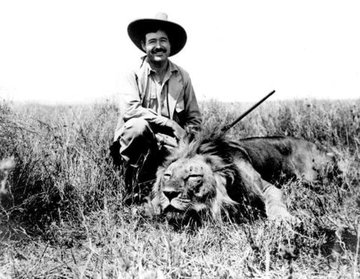The Snows of Kilimanjaro - Summary
by Ernest Hemingway
The Snows of Kilimanjaro was published in 1936 in Esquire. We offer this summary to accompany the full text, The Snows of Kilimanjaro. Featured in Winter Sports Stories.

The main character in The Snows of Kilimanjaro is a man named Harry. He has gone to Africa on safari where he is punctured by a thorn and develops an infection. The infection progresses rapidly and he advances towards a slow death. This realization gives him time for introspection about his life, work, and the people closest to him (perhaps his sickness creates hallucinations as well).
Though he is a writer, he has been reluctant to write, and it seems that he believes some of the finer things he has seen and realized in his life will remain uncaptured and unwritten. In the following excerpt (quoted under the fair-use doctrine), Harry expresses some of the regret while thinking about the woman he loves now (Helen) and the other women that he has loved in his life:
Harry argues with Helen, attempting to blame her for several of his acute short-comings which include; living decadently and drifting away from genuine people, instead choosing to live comfortably among the rich, who were not worth writing about:
As he approaches death, Harry seems to lapse into a dream-state where he imagines that a rescue plane is coming to take him to the top of Kilimanjaro, the highest mountain in Africa. Harry engages the pilot, Compton, in some playful banter and boards the plane. As they head towards its western summit, called the "Masai "Ngaje Ngai" (the House of God), he sees a legendary leopard. Harry realizes that the plane taking him to the mountain means his death. "Just then the hyena stopped whimpering in the night and started to make a strange, human, almost crying sound." Helen awakens to find that Harry has died in his sleep.
This story has very poignant, autobiographical overtones for Hemingway. The parallels to his life, particularly during 1936, are unmistakable. And they seem to persist into his future as well, revealing his realization of his own vulnerability and mortality. When awarded the Nobel Prize in Literature in 1954, he was injured and unable to attend the ceremony, so he sent a letter which was read aloud at the event. A quick examination of that speech reveals that some of the same thoughts and themes exposed in The Snows of Kilimanjaro still haunted him in 1954, revealed in his Nobel Prize acceptance Banquet Speech, in which he reflects on the introspective loneliness of a writer's life.
You may also enjoy reading Sir Arthur Conan Doyle's essay, An Alpine Pass on Ski.